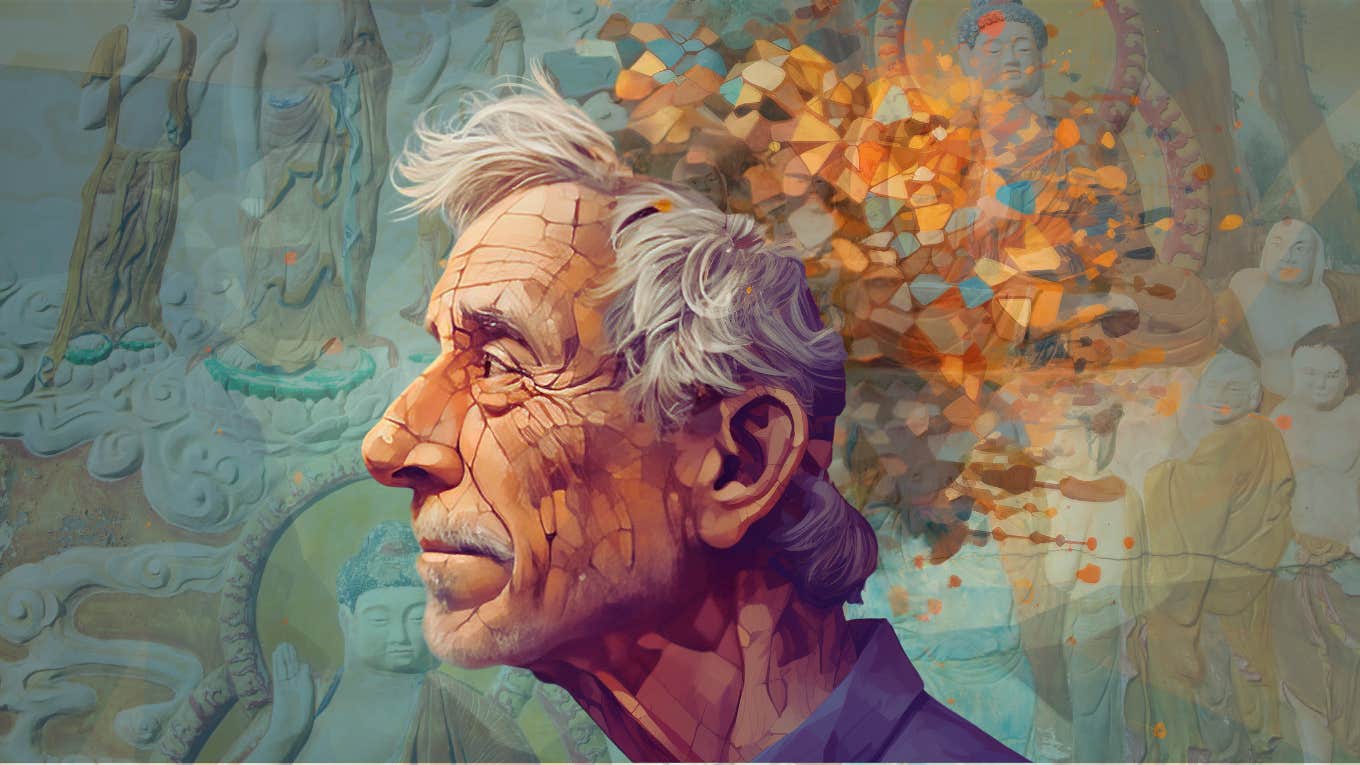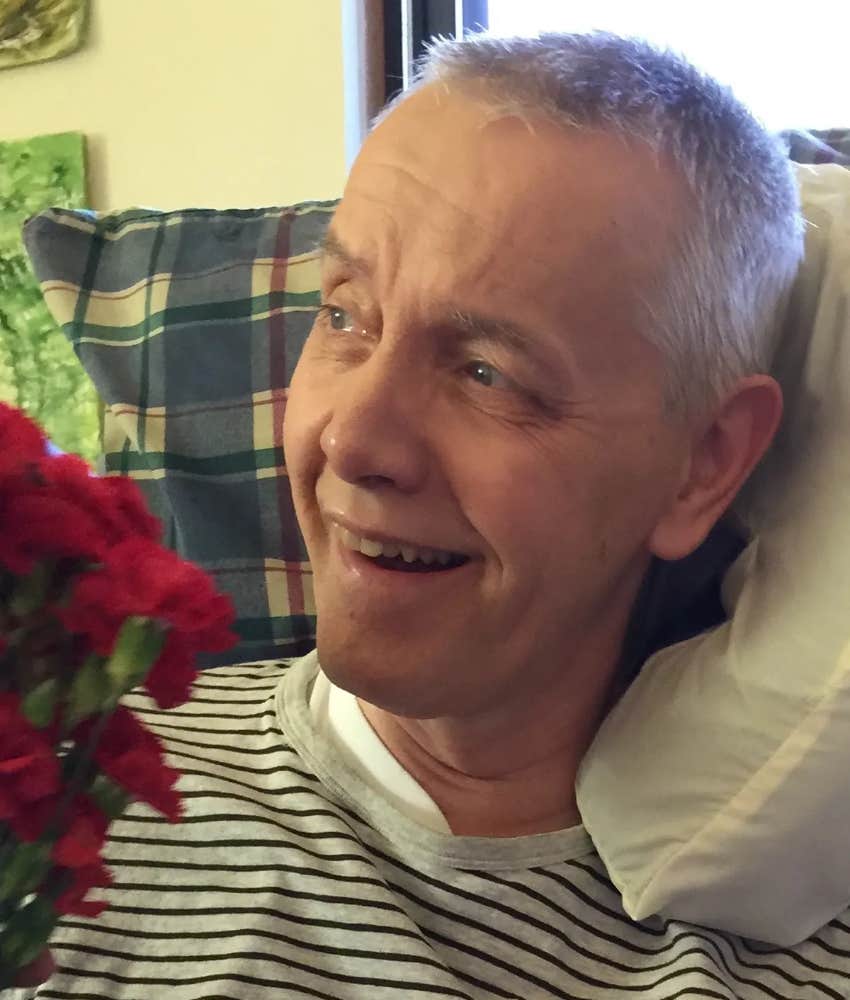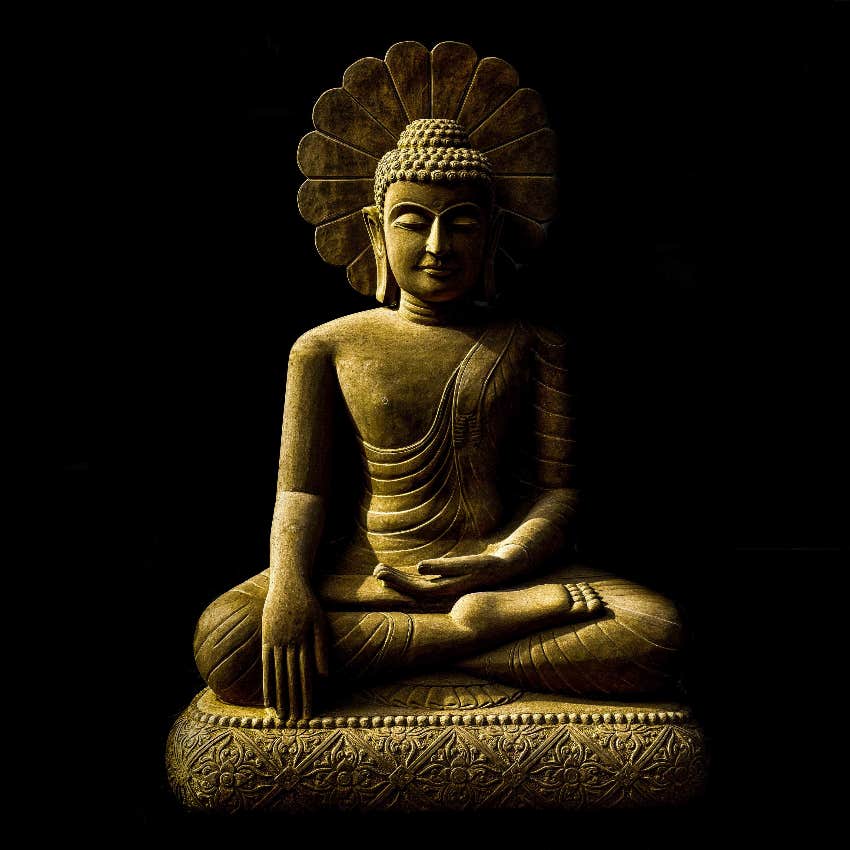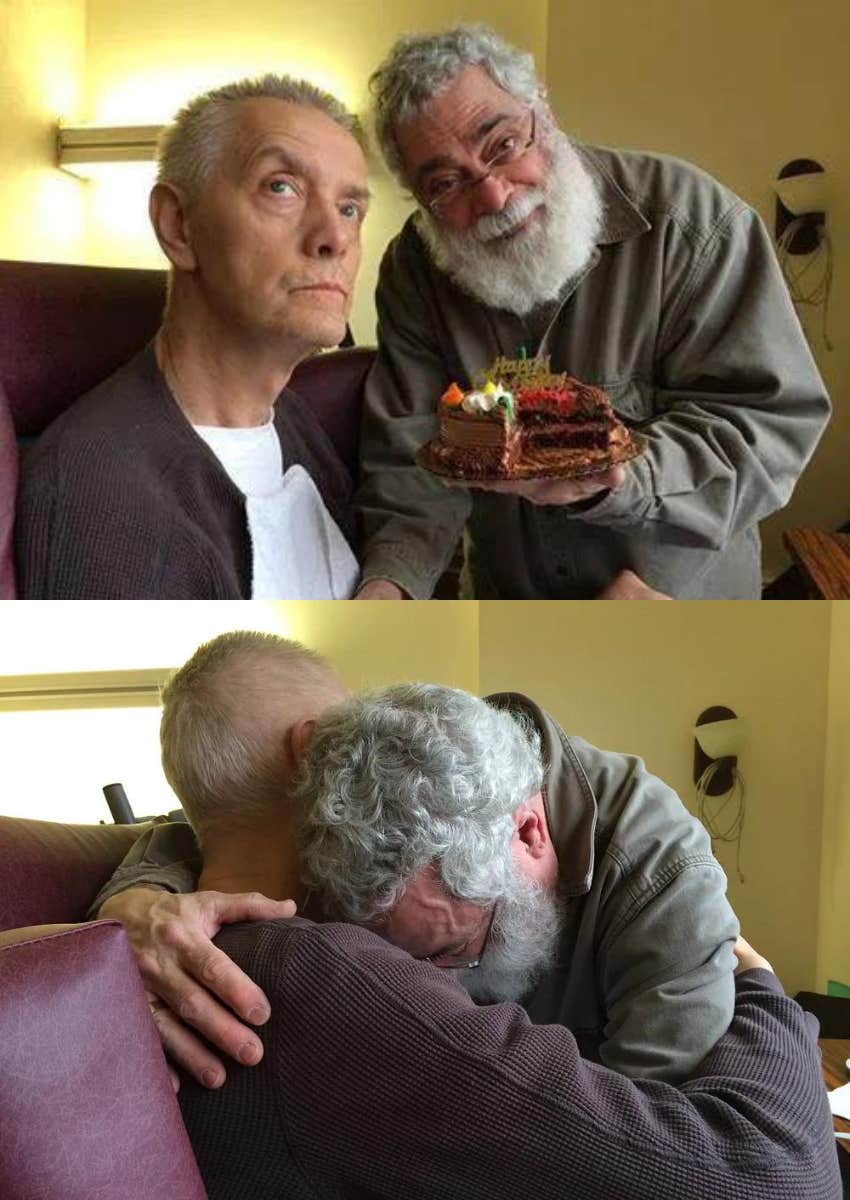In My Gay Marriage, His Dementia Was A Roller Coaster Ride
Buddhist lessons for caregivers dealing with Alzheimer’s Disease.
 szefei, Huseyn Mehdi | Canva
szefei, Huseyn Mehdi | Canva If one can gracefully accept the changes that dementia and Alzheimer’s Disease bring, rather than fighting them, it can be easier for the person living with the disease, for his caregiver, and for those who love him. Easier said than done, but possible.
This is a huge assumption because dementia is a life-altering illness that affects the person, his family, and those around him. It is a disease that cannot be majorly improved with medications, is not curable, and ends in death, sometimes after years of suffering.
In many ways, my husband, Gregory, was able to accept the changes that his dementia brought, and I, as his partner, did an amazing job of supporting him during his twelve-year journey with the disease. I am not beating myself up but if I could have been more aware of using the teachings I gained from my studies in Buddhism, which I began in earnest early during his disease, I believe that things could have been even better for both Gregory and myself.
 Photo from author | My husband Gregory (RIP) lived with dementia/Alzheimer’s from 2 to 03–2015
Photo from author | My husband Gregory (RIP) lived with dementia/Alzheimer’s from 2 to 03–2015
I came to this awareness eight years after Gregory died in 2015.
The awareness did not depress me because of the missed opportunity but rather made me smile at the simplicity of it. It also made me feel good that I could share these Buddhist teachings with others.
A brief overview of Buddhism includes The Three Jewels, The Four Noble Truths, The Eightfold Path, and The Three Universal Truths. My writing here was informed by An Introduction to the Way of the Buddha: Buddhism for Beginners by Shalu Sharma.
Wouldn’t it be wonderful if one could change undesirable behaviors merely by deciding so? Not easy. Often our problems come from deep-seated experiences that happen earlier in our lives, including suffering great loss and/or depression. When a major health “hint” is dropped — like a stroke, heart attack, diagnosis of diabetes, contracting HIV/AIDS, etc. — often people make a major change in their lives.
When a vision of a difficult future shows itself, often people are capable of changing overnight.
The application of Buddhist Practices made living with dementia/Alzheimer’s easier for Gregory and me.
With dementia, there's no reversal of the disease. The slow loss of physical, emotional, and cognitive abilities is very complex and not easy to deal with, no matter how committed one is and how great your love is for the person diagnosed.
Each person realizes the disease in their unique way. There may be some universal behaviors, symptoms, etc., but for the most part, each experience is different for each person. When dealing with others, family relationships count: if those are difficult relationships, dealing with the disease will also be difficult. When the relationship is a good one, coping is easier.
When the person diagnosed can no longer work, finances, medical expenses, and outside support are very costly. Medicare and Medicaid can help, but often not enough.
Often, other circumstances like old age, heart problems, other diseases, etc. cause death. Otherwise, the person dies from dementia. The journey can be relatively short or go on for years and years.
Talking about death has always been difficult for most of us. In this case, one must admit that death is not a horrible thing to face but often a blessing. Some people live with dementia for a year or so; others live for many years.
The average life expectancy for Alzheimer’s Disease, the most common type of dementia, is around eight to 10 years. Life expectancy is less if the person is diagnosed in their 80s or 90s; some with Alzheimer’s live longer, sometimes for 15 or even 20 years.
Next, I will talk about some of Gregory and my understandings of Buddhism which helped to make his journey with dementia/Alzheimer’s Disease a little easier for both of us.
 Photo: Attasit saentepn / Shutterstock
Photo: Attasit saentepn / Shutterstock
RELATED: My Ex’s Buddhist Funeral Made Me Reconsider Grieving
The Three Jewels
The Three Jewels include: Respecting the Buddha’s way (Buddha), learning from the Buddha’s teachings (Dharma), and having a like-minded community (Sangha) in which to belong.
Gregory and I had always been interested in Buddhism and studied it here and there. With Gregory’s diagnosis, I began studying it in earnest. I attribute my ability to deal with supporting him and keeping my sanity to my Buddhist beliefs (Buddha) and the teachings (Dharma) he gave during his life. We found a community (Sangha) of people: family and friends who were there for us as we walked the dementia Path.
The Four Noble Truths
The Four Noble Truths include: Suffering, The Origin of Suffering, the Cessation of Suffering and the Path for Cessation of Suffering.
Suffering
We all will die. That is a given. Most of us will contract a disease that will slowly or quickly take life from us. An unexpected accident may take our lives. The mere act of living and aging may eventually claim us.
Living with the knowledge that one is going to die sooner than one had hoped isn't easy. In some ways, we all erroneously believe that we and the ones we love will never die. And when it happens, it's a surprise and sometimes a blessing.
The Origin of Suffering
In our case, Gregory’s dementia/Alzheimer’s was going to be the “boogeyman” who caused us to suffer and eventually end his life. But when we received the diagnosis, we were relieved, because we now knew what was causing the changes in him and we could learn to live with it as well as possible and plan for the future.
The Cessation of Suffering
I created for Gregory a life in which he had no worries, no expectations, and no responsibilities that he couldn't handle. I made sure he knew who he was and where he was, that he was safe from danger, and if lost, physically or emotionally, that I/we would always find each other. He knew he could trust me, and that he was safe, loved, valued, and respected
The Eightfold Path
The Eight-fold path includes: Right Understanding, Right Intention, Right Speech, Right Action, Right Livelihood, Right Effort, Right Mindfulness, and Right Concentration.
I believe that Gregory’s and my success in walking the Eightfold Path during most of our relationship, pre-dementia/Alzheimer’s diagnosis, contributed to our success in dealing with life once the disease was upon us.
Right Understanding
For most of our relationship of 41 years, both Gregory and I had worked at integrating those philosophies of life with which we agreed and getting rid of others. Being gay, we practiced creating our belief systems and ignoring what others thought.
Right Intention
We worked at being selfless, generous, and detached from desires and cravings. We led a good life, supported others when we could, and tried not to inappropriately hold on to things as things always change.
Right Speech
We practiced not speaking to others with disrespect, maliciousness, or abusive language. (We especially practiced this with each other!)
Right Action
Neither of us participated in dishonesty, vices, sexual overindulgence, illegal activities, or violent behavior. We had an agreed-upon non-monogamous relationship but always put each other first in all things, including our loyalty and commitment to each other.
Right Livelihood
I was an elementary school and college-level teacher, and Gregory was an architect and interior designer. We believed our roles, in different ways, were to make life better for others.
Right Effort
We were able to live our lives in a way that was good for ourselves and our ability to support others.
Right Mindfulness
We, individually and as a couple, kept an eye on and jointly talked about our sensations, feelings, emotions, mental states, and physical bodies.
Right Concentration
We continually tried to stay aware of living the best life we could.
RELATED: How Dementia Villages Have Restored My Faith In The Future Of Healthcare
The Three Universal Truths
The three universal truths include impermanence, non-self, and suffering.
Impermanence
Nothing is permanent; nothing is forever. Things are always changing. We are no longer the people we were this morning or yesterday. Old body cells are sloughed off, and new ones grow. We eat, digest our food, take nutrients from the food, and eliminate the rest. During the day, we have new thoughts and ideas and get rid of ones that no longer apply. Nature is ever-evolving. Everything moves forward; there is no playback in life.
Non-Self
Understanding this allowed me a more positive outlook on life for Gregory and myself. While it did not make things better, accepting that the disease would get worse and that eventually Gregory would die from it, did make us act more realistically and made his diagnosis easier to accept.
Suffering
As much as possible, Gregory and I accepted the changes and future we knew we would face and therefore were able to live and enjoy each day to its fullest. Even with the changes, some major, that Gregory was going through, we continued to love each other, to eat well, to spend time with family and friends, to travel, to enjoy entertaining and celebrating the holidays, and above all to be grateful for each other, our love, and the life which was still available to us, even though changed. Each day was a new one which enabled us to begin again no matter how rough the previous one had been.
The above are examples of how Gregory and I were able to apply what we learned by studying Buddhist Precepts and by building Buddhist Practices in as many parts of our lives as possible. We were better able to deal with walking the dementia/Alzheimer’s Path as successfully, lovingly, and mindfully as possible. It was an ordeal, it was like riding a very wild wooden roller coaster, but it could have been a lot worse.
 Photos taken by dear friend Patricia Anderson on Gregory’s final birthday celebration with Michael
Photos taken by dear friend Patricia Anderson on Gregory’s final birthday celebration with Michael
Wouldn’t it be wonderful if just knowing and understanding the teachings of the Buddha could make dementia/Alzheimer’s go away? It cannot, but with practice, it can be much easier to live with.
Eight years later, I miss Gregory very much and I love him more than ever. We did a good job walking the path of dementia/Alzheimer’s Disease. We were not victims of the disease; we were heroes.
RELATED: 6 Deep Experiential Truths I Learned From 90 Hours Of Meditation In 10 Days
Michael A. Horvich holds his BA in Liberal Arts and Sciences, his MA as an Education Generalist with a concentration in Gifted Education, and an Advanced Certificate in Education Administration and Supervision. After a 30-year elementary school and university teaching career, Michael has been retired for 30 years and is active as an educator, storyteller, writer, poet, photographer, blogger, artist, bookbinder, lecturer, actor, supernumerary, museum curator, flea circus ringmaster, and Dementia/ Alzheimer’s advocate and caregiver partner for his life partner Gregory Maire (RIP.)

